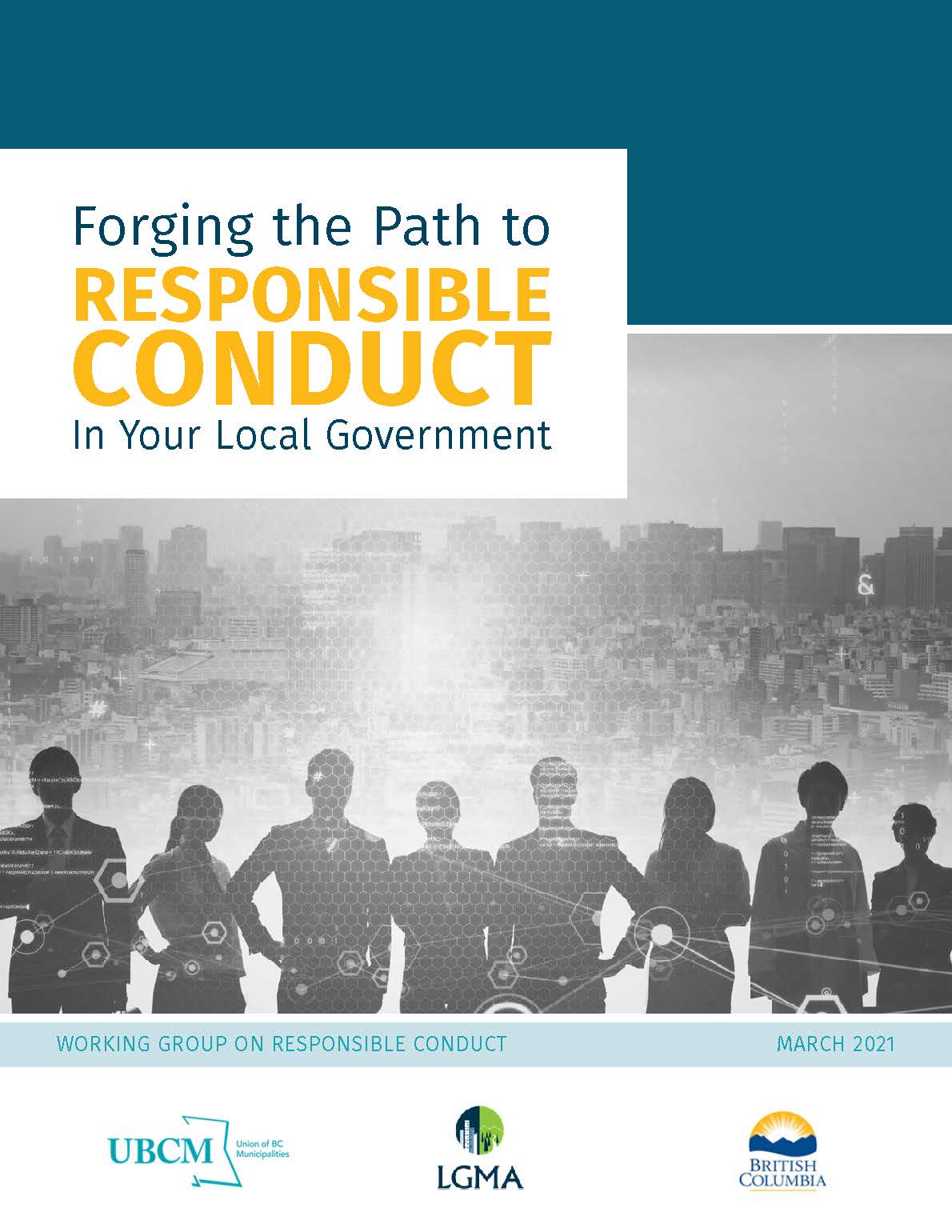Responsible conduct of locally elected officials
How elected officials conduct themselves in their relationships with elected colleagues, staff and the public is directly connected to how a community is governed. These three groups play a significant role in helping local elected officials carry out their collective responsibilities as decision-makers of their communities.
Responsible conduct is grounded in elected officials conducting themselves according to principles such as integrity, accountability, respect, and leadership and collaboration in a way that furthers a local government’s ability to provide good governance to their community. Good governance includes:
- Providing for the stewardship of a community’s public assets
- Providing services, laws and other matters for community benefit
- Acting in a way that is accountable, transparent, ethical, respectful of the rules of law, collaborative, effective and efficient
If a local government faces issues related to less-than-responsible conduct, it may affect the local government’s ability to provide good governance to their community. These issues may include:
- Disputes among elected officials on municipal council and regional district boards
- Mistreatment of staff members
- Conflict of interest violations
- Alleged breaches of procedures or rules during meetings or the duty to respect confidentiality
- Marginalization of specific council or board members
- Inappropriate use of social media
Working Group on Responsible Conduct
The Working Group on Responsible Conduct (WGRC) is a joint initiative of the Union of BC Municipalities (UBCM), the Ministry of Housing and Municipal Affairs and the Local Government Management Association (LGMA).
The staff-level working group was formed to better understand issues related to responsible conduct and to explore how B.C.’s responsible conduct framework could be further strengthened.
In 2021, Resolution SR3 (Strengthening Responsible Conduct) was endorsed by UBCM members. This resolution included several requests that would strengthen B.C.’s responsible conduct framework. The WGRC is collaboratively working to implement and evaluate the requested changes to the existing framework.
Working Group on Responsible Conduct resources
The WGRC has developed various resources that can be used by local government staff and elected officials to support responsible conduct.
The Foundational Principles of Responsible Conduct (PDF, 178KB) document can be used as a resource to guide the conduct of both individual elected officials and the collective council or board. The key principles included in this resource are integrity, accountability, respect, and leadership and collaboration.
The Forging the Path to Responsible Conduct (PDF, 2MB) guide provides advice on fostering responsible conduct, maintaining good governance, resolving conduct issues informally, and the essentials of code of conduct enforcement. The guide provides examples, leading practice tips, things local governments should consider, and links to further information and resources.
Current responsible conduct framework
The tools available to address or prevent less-than-responsible conduct by locally elected officials include education and training, codes of conduct, legislation, legislated offices and the courts. Together, these provide support and guidance for local government elected officials so that they may govern effectively and according to good governance principles.
Advice, education and training
Partner organizations, such as the UBCM, LGMA, and the Local Government Leadership Academy (LGLA), provide advice, education, and training for elected officials and staff including topics related to responsible conduct. Educational opportunities include interactive workshops (LGLA forums and LGMA programs), self-directed online courses, and downloadable educational materials and best practice guides.
Codes of conduct
A code of conduct is a written document that set shared expectations for conduct or behaviour. Municipal councils and regional district boards are required to consider adopting or updating a code of conduct following a general local election.
The WGRC has developed a model code of conduct that set out shared principles and standards of conduct to help councils or boards get started on developing their own code of conduct. The document is also useful for councils or boards who wish to review or refresh an existing code of conduct.
A companion guide is also available to facilitate a council or board’s conversations as they go through the process of developing their own code of conduct. This guide provides discussion questions, things to keep in mind, and other helpful tips and resources.
Legislation
The Community Charter and Local Government Act set out the purposes of municipalities and regional districts, the roles and responsibilities of elected officials and specific obligations of the local government itself. Other legislation such as the Workers Compensation Act and the BC Human Rights Code require local governments to meet their obligations as employers to ensure the health and safety of their employees and to address and prevent inappropriate behaviour.
Legislated offices
Legislated offices have targeted oversight functions related to local government. These offices include:
- Inspector of Municipalities
- Office of the Information and Privacy Commissioner
- Office of the Ombudsperson
- Office of the Auditor General for Local Government
Note: The Auditor General for Local Government office stopped operations in March 2021.
Issues related to responsible conduct of individual elected officials typically fall outside the mandates of these offices.
Courts
The judicial system (the courts) plays a significant role as judges are responsible for making final decisions about legal matters that relate to responsible conduct.
The guide Forging the Path to Responsible Conduct in Your Local Government (PDF, 2MB) presents practical ways to help prevent conduct issues and to deal with them if they arise.
Guidance and resources
Related links
Contact information
Contact us if you have questions about responsible conduct for locally elected officials.
250 387-4020
1 800 663-7867

